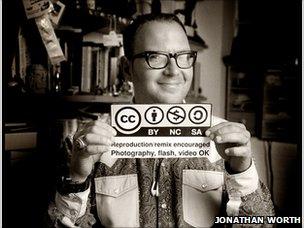Copyright group Creative Commons targets web users
- Published

A campaign has been launched to help people avoid breaking the law when they post pictures, music and videos online.
Copyright group Creative Commons has published a guide to identifying material that can be used freely without getting sued.
It is also advises individuals how to protect content they have made themselves.
Some legal experts say that the system is a stop-gap measure and want to see copyright laws radically reformed.
Around 500 million pieces of work are currently covered by Creative Commons.
The free-to-use legal licenses add a range of protections to content.
At one end of the scale, a rights holder can choose to share their property with anyone, and let them do what they like with it.
Stricter versions of the licences protect material from being manipulated or used for commercial purposes.
Creative Commons' chief of staff, Lisa Green said that the campaign was partly aimed at combating the myth that it supported "giving everything away for free".
"Rather than giving away, mostly we talk about enabling legal sharing and enabling remix," she told BBC News.
Photographer Jonathan Worth explained that Creative Commons allowed him to sell his work for commercial use while still giving it free to individuals who wanted it for other reasons.
"It is very empowering because I can allow the 14-year-old blogger who has got a fan site for Casey Affleck or Heath Ledger to use the images and she becomes someone that promotes my work.
"She is never going to pay me. She is time rich and cash poor. If I don't allow her to use the images then she is going to find a way to use them anyway," said Mr Worth.
Without such licensing, the young blogger would technically be in breach of copyright law.
Creative Commons licensing terms can be "mixed and matched" to suit the rights holder. Jonathan Worth, for example, uses Attribution + Non-commercial + share alike, meaning he must be named as the creator, the image cannot be used in a commercial venture and it can be shared under the same terms.
Legal changes
While many legal observers have praised the efforts of Creative Commons to make copyright more accessible, they point out that the system is not without its flaws.
"Non-commercial is a good idea in principle, but it is incredibly difficult to define," said Dr David Berry, senior lecturer in digital media at Swansea University.
"When you think of someone putting music onto their blog, often there is lots of embedded advertising. It might only make a few pennies, but that is technically commercial."
Creative Commons has also been criticised as a system which masquerades as creating a common pool of content, while leaving individual rights holders the ability to alter the terms of sharing at will.
Copyright specialist Iain Connor from law firm Pinsent Masons said that any attempt to raise awareness of terms of use was a good thing.
"The general public has no knowledge of copyright. This will probably assist everybody in the creative industry," he said.
However, he added that there remained a need to re-examine all current copyright laws to make them fit for the internet age.
Mr Connor pointed out that the UK lacks an equivalent to the United States' concept of fair use, where individuals enjoy limited legal protection when re-using other people's work.
The recent Hargreaves Review of the UK's intellectual properties laws rejected the idea of replicating the US system.
Without such safeguards, say the proponents of Creative Commons, it is even more important that ordinary web users know where they can find content with easy to understand terms of use.
- Published18 May 2011
- Published13 March 2011